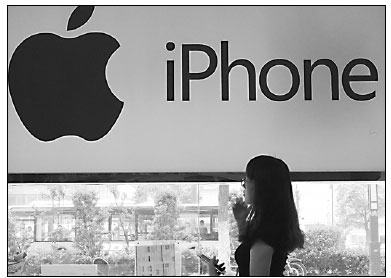Despite its fame, Apple needs lessons in patient care
Updated: 2015-09-02 08:38
By Meng Jing(China Daily USA)
|
||||||||
Some of the best hospitals in China are notoriously difficult to get into.
The reason is simple: A lack of top-notch doctors is failing to keep up with demand from patients, who as a result are now being forced to travel all over the country to find the best medical advice. Queuing has become the norm, often starting in the middle of the night.
But getting urgent help in China isn't restricted to our own bodies.
The health demands are just as acute for the other most important aspect of our daily lives - the well-being of our mobile phone.
I recently set out on what proved to be just as long a mission to get my iPhone mended.
At first, I didn't think finding help for my expensive, yet poorly functioning device which I bought six months ago would take much effort.
After all, Apple has in place its very own patient support system: Its Genius Bars - tech support stations located inside retail stores (there are four Bars in Beijing), which are purpose-built to offer help and support to both the owners of, and the sick Apple products themselves, or in other words, the company's very own accident and emergency department.
"Have a problem with your Mac, iPod, or iPhone? Stop by Genius Bar at an Apple retail store for hands-on diagnosis and troubleshooting," the website told me.
Armed with that comforting knowledge, I went online to book an appointment with my local Geniuses - only to be told there were none available.
Bear in mind, our mobiles these days are nearly as vital as our major organs. So panic quickly set in.
"This is the only phone I own," I heard myself saying. "If it doesn't work, then neither do I."
I decided to go directly to my nearest Apple store, only to be told in no uncertain terms by the assistant, "no appointment, no support".
After explaining the urgency of the situation to a staff member there, I was given hope: I could wait to see if any bookings become suddenly available if another "patient" failed to show up.
Three hours dragged by. I found myself pacing alongside other desperate owners.
There were the topless tattoo guy, the mother with the noisy child, the office worker worried about being absent from work.
Worry was etched on all of our faces. At one point I feared public disorder when an appointment opened up, only to be filled.
I started to get hungry, but I certainly couldn't walk away for food.
And maybe worst of all, I had to put on a smiley face to check with the Geniuses, every five minutes, what my chances were of becoming "the lucky one".
I comforted myself, that at least I was there. I lived in a city where the Geniuses were close-by. There was at least a chance, albeit a faint one, that mine would be seen.
I found my heart going out to all those poor souls who can't come here and take part in such a vigil. There must be so many more, I thought - Apple customers who live in cities where there are no Genius Bars to wait in line for help.
Apparently, the Genius Bar is generally equipped with a dozen tech experts, but I soon realized even that number was clearly failing to meet the demands of these "patients".
These hard-to-get appointments, I also discovered, have even sparked a new business on Taobao, where slots are now being sold for between 10 yuan ($1.57) and 50 yuan.
At this stage I would happily have spent much more.
I was finally seen that day. I was told the battery was a gonner. I would need to wait three days, for a replacement phone.
China is already iPhone's biggest market. The company's latest quarterly report revealed in July that greater China market contributed 26.7 percent of its group revenue and 29.9 percent of its operating profit. However, by March, of the company's 450 retail stores globally, just 21 were open here.
This huge global firm has made strenuous efforts to lure Chinese customers by launching continually bigger and brighter screens, better-looking devices in every conceivable color, and functions that are too many to list.
But with the emergence of China's very own smartphone makers, and increasingly fierce competition in the market, Apple appears to be missing one of the fundamentals of business: Ensuring its after-sales service is as slick as its products.
For those who are addicted to the Internet, nothing can ruin your day more than a sick smartphone.
But unlike real patients, who must be cured, anyone can replace a malfunctioning device with a cheaper and newer substitute. Be warned Apple.
Contact the writer atmengjing@chinadaily.com.cn
|
A customer at a smartphone store in Lianyungang, Jiangsu province, on Monday.Geng Yuhe / For China Daily |
(China Daily USA 09/02/2015 page14)
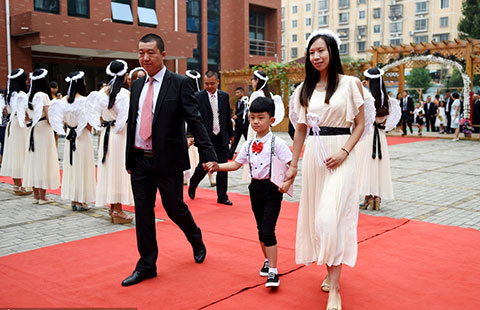
 Red carpet ceremony for first grade kids
Red carpet ceremony for first grade kids
 Kashgar old city in Xinjiang is well preserved
Kashgar old city in Xinjiang is well preserved
 Infographic: Symbols behind numbers
Infographic: Symbols behind numbers
 Beijing's preparations begin long before the parade starts
Beijing's preparations begin long before the parade starts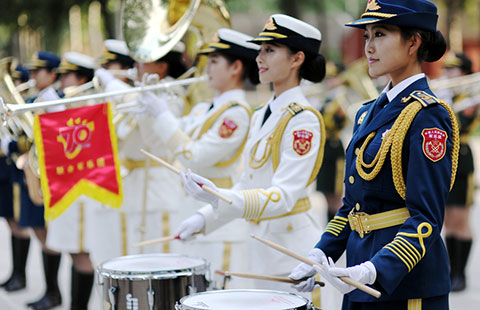
 Female soldiers of military band practice for the V-Day parade
Female soldiers of military band practice for the V-Day parade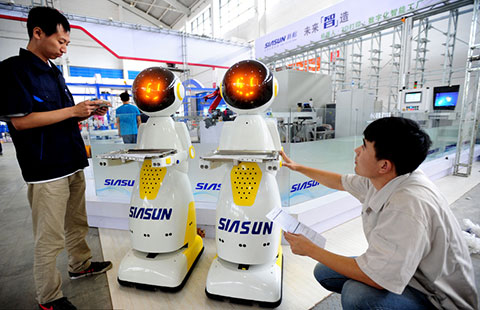
 Robotic exhibition set to kick off in Shenyang
Robotic exhibition set to kick off in Shenyang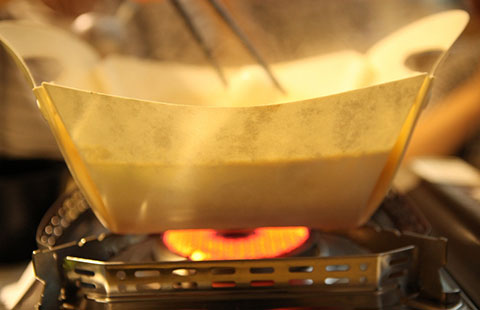
 Eat from a paper hotpot
Eat from a paper hotpot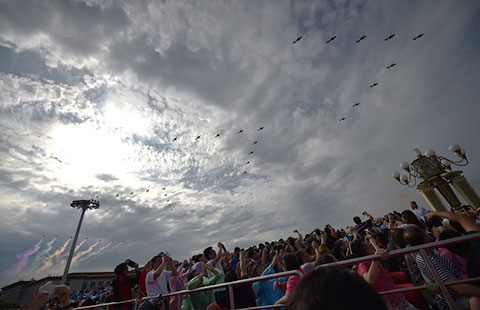
 8 interesting facts about the upcoming V-day Parade
8 interesting facts about the upcoming V-day Parade
Most Viewed
Editor's Picks

|

|

|

|

|

|
Today's Top News
Xi awards medals to veterans
China and US working closely on every major issue: Envoy
$16b added by 50 brokerages to support shaky market
PLA to showcase top weapons for the first time in parade
Senior US official to visit China on bilateral issues
China manufacturing PMI falls to 49.7 in August
Second homes in China need lower down payment
Xi meets with former KMT chairman
US Weekly

|

|
